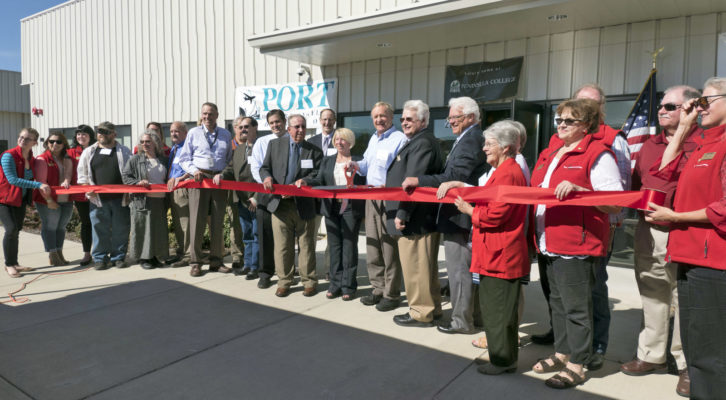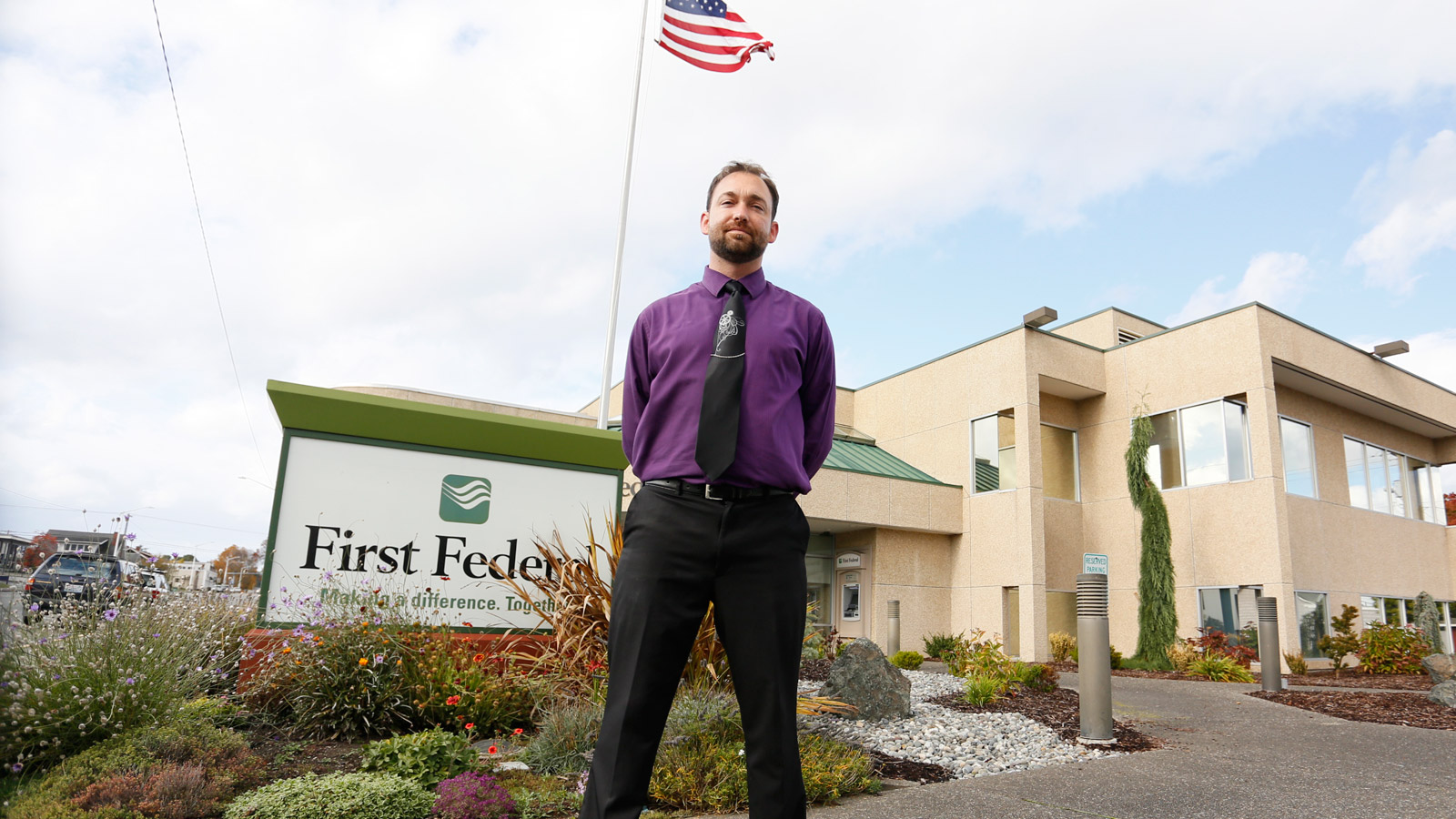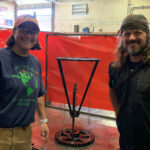Port Angeles and Clallam county leaders gathered Thursday to celebrate the completion of a new advanced manufacturing center that will bring jobs and economic development to the region. The Composite Recycling Technology Center (CRTC) is the only facility on the planet to transform uncured carbon fiber composite scraps previously bound for landfills into new products. Thursday’s ribbon cutting was a celebration for local leaders that will be followed by the grand opening in November, which will bring state, federal, and international participants to the facility.
The Port of Port Angeles led the initiative to establish the infrastructure for the new building, and to launch what is now the independent non-profit CRTC. Not only will the facility bring new jobs to Clallam County, it also will house Peninsula College’s Advanced Manufacturing – Composite Technology program to give students classroom and hands-on training in advanced materials recycling and remanufacturing techniques.
The event focused on celebrating with the local community that came together in a unique public-private partnership to establish a state-of-the-art facility for advanced manufacturing and composite recycling on the Port’s Composite Manufacturing Campus. Speakers also highlighted future plans and how the CRTC and Peninsula College will be employed as an economic development engine for Clallam County going forward. The Port of Port Angeles received funding for the new facility through a $2M grant from the US Department of Commerce, Economic Development Administration; $1M from the WA Department of Commerce, Clean Energy Fund, and $1M from Clallam County Opportunity Funds. Additional support for improvements to the Composite Manufacturing Campus and new facility was provided by the City of Port Angeles in the form of services for utility infrastructure, road infrastructure improvements, and in-kind staff support.
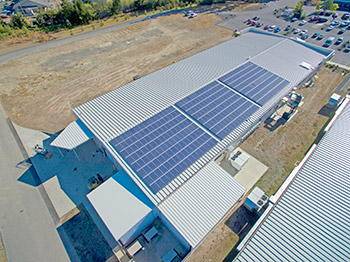
91 kilowatts of installed solar photovoltaic capacity on the roof of the facility
The Port of Port Angeles provided funding for architectural design and engineering work, as well additional costs that were not included in the grant funding. These costs included funding for 91 kilowatts of installed solar photovoltaic capacity on the roof of the facility. The quantity of clean energy to be generated will offset some of the energy that will be consumed by the CRTC equipment for product manufacturing. The solar panels have already generated 22,000 kWh of clean electricity, and offset 38,000 lbs of CO2.
The Port has also committed to an “Economic Development Services Agreement” with the CRTC. The full value of the commitment over three years (2015-2017) totals $1.9M, including in-kind contributions. This funding is being offered as match to the WA Department of Commerce, Clean Energy Fund for a pending grant request of equal value. The new funding will be utilized by CRTC to purchase equipment for advanced manufacturing and R&D utilizing carbon fiber scrap.
Port Commissioner Connie Beauvais said, “The CRTC is the perfect example of how thinking outside the box can bring economic prosperity to Clallam County. We gathered forces in the community to form an impressive public-private partnership to launch this new initiative in composite recycling.”
The CRTC has successfully moved into their new space and is ramping up for start of production and product launch, which will be celebrated at a Grand Opening ceremony in November. The CRTC will take uncured carbon fiber scraps, diverted from landfills, and utilize it in direct manufacturing of new products. In addition to product manufacturing, CRTC is engaged in research and development (R&D) efforts to advance the composite manufacturing industry. CRTC recently announced an agreement with IACMI –the National Composite Institute — which has already resulted in funding for a research and development project involving automotive lightweighting through the use of recycled carbon fiber materials. This project is being led by Toray Composites Americas (Tacoma, WA based carbon fiber producer and MOU partner to CRTC) in collaboration with several other Washington State companies and additional partners.
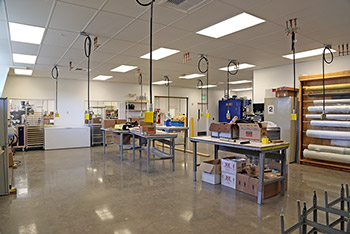
Inside the Peninsula College classroom
“Innovative products made from recycled carbon fiber provide this region with opportunities for transforming our economy, attracting and training the best and brightest, and leading the nation in sustainable composites manufacturing.” said Robert Larsen, CRTC CEO.
In addition to the CRTC, the new facility also houses Peninsula College’s Advanced Manufacturing – Composite Technology program with space for classrooms, offices, and lab facilities. This program includes the first-of-its-kind Composite Recycling Certification, and hands-on composites manufacturing Lab. The program gives students classroom and hands-on training in advanced materials recycling and remanufacturing techniques. Peninsula College has relocated their full composites program into the state of the art facility on the Port’s Composite Manufacturing Campus, in time for start of classes the next quarter. The co-location with CRTC provides students with unequaled opportunities for internships, hands on manufacturing and R&D experience, and exposure to production operations.
“We’re excited to be participating in the development of the CRTC as a key educational partner,” said Luke Robins, President of Peninsula College. “Partnerships such as the CRTC create great synergy between public and private entities, provide outstanding learning opportunities for our students, and can be dynamic catalysts for economic development for our region. We look forward with great anticipation as the CRTC develops and matures.”
“It’s exciting that Port Angeles has the only facility in the world to recycle un-cured carbon fiber composite into new products, and even better to see that this effort is bringing good jobs into our region as well as training the next generation of workers,” said Clallam County Commissioner Bill Peach.
“CRTC is a great example of how working together is powerful and can bring good jobs to our region. Because of the strong partnerships among the County, City, Port and Peninsula College, we were able to attract federal, state, local and private investment that will result in good jobs and economic growth,” said City of Port Angeles Mayor Patrick Downie.
More Information
For media inquiries, please contact:
Holly Hairell, Port of Port Angeles
(360) 417-3454
hollyh@portofpa.com
Kari Desser, Peninsula College
kdesser@pencol.edu
About the Port of Port Angeles: The Port of Port Angeles is a municipal corporation established in 1923, following approval of Clallam County voters. The Port is responsible for promoting and enhancing the economic vitality of Clallam County through business development and job creation, and serves the community as both a public steward and an economically self-sustaining enterprise. The Port operates, manages, and makes capital investments in four lines of business: marine facilities, marinas, airports, and industrial properties. These businesses include four marine terminals, two airports, two marinas, three industrial business parks, and several other industrial and commercial properties. Find out more at www.portofpa.com
About the Composite Recycling Technology Center (CRTC): CRTC is an innovative non-profit company founded in 2015 whose mission is to lead and grow a composite recycling industry that diverts carbon fiber scrap destined for landfills, and turns it into value-added products. Since carbon fiber is stronger than steel with significantly lower weight (up to 75% less) the product applications in segments like transportation, clean tech and high performance sporting goods are boundless. The CRTC will accomplish its mission through direct product manufacturing and by providing research and development to advance the recycled composites industry. The CRTC is supported through commitments from the Port of Port Angeles, with infrastructure investment from partners at the US Department of Commerce-Economic Development Administration, WA State’s Clean Energy Fund, Clallam County, and City of Port Angeles. Find out more at compositerecycling.org.
About Peninsula College: Peninsula College provides educational opportunities in the areas of academic transfer, professional and technical, basic skills, and continuing education. Their Advanced Manufacturing – Composites Technology Program prepares students for the wide-ranging field of composite structure fabrication and repair. Through classroom work and hands-on training, the program equips students with skills necessary for employment in the aerospace, marine, and recreational equipment industries, as well as many others that use composite materials. More information on their Advanced Manufacturing – Composites Technology Program can be found at: pencol.edu/proftech/composites-technology

